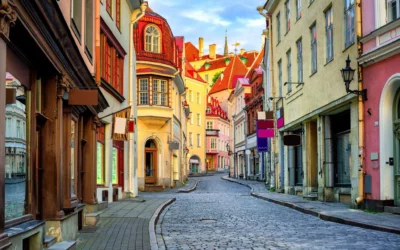Bangkok is known in Thai as Krung Thep Maha Nakhon (meaning “City of Angels“), and it’s the capital city of Thailand. The city’s population in 2021 was roughly 10.7 million, and it’s the 2nd most popular digital nomad destination, according to Nomad List.
Table of Contents
- 1 Geography
- 2 Visa Application
- 3 Neighborhoods popular with digital nomads
- 4 Cost of living and cost of living arbitrage
- 5 Accommodation
- 6 Utilities
- 7 Groceries
- 8 Best co-working spaces
- 9 Crypto community
- 10 Nomad community
- 11 Local nomad job opportunity
- 12 Popular recreational activities and fun spots
- 13 Transportation
- 14 Security/ safety
- 15 Cultural and social norms
- 16 Political and economic stability
- 17 Language and language barriers
- 18 Health
- 19 Electrical and measurement standards
- 20 Internet
- 21 Telephone services
- 22 Payment services and infrastructure
- 23 Climate and seasons
- 24 Popular Cuisine
- 25 Tax requirements on digital nomads
- 26 Common concerns
It’s a top destination for digital nomads due to its warm year-round weather and excellent infrastructure comparable to developed countries. The city offers fast internet to facilitate online remote work and many fun activities to do. Plus, it’s relatively safe.
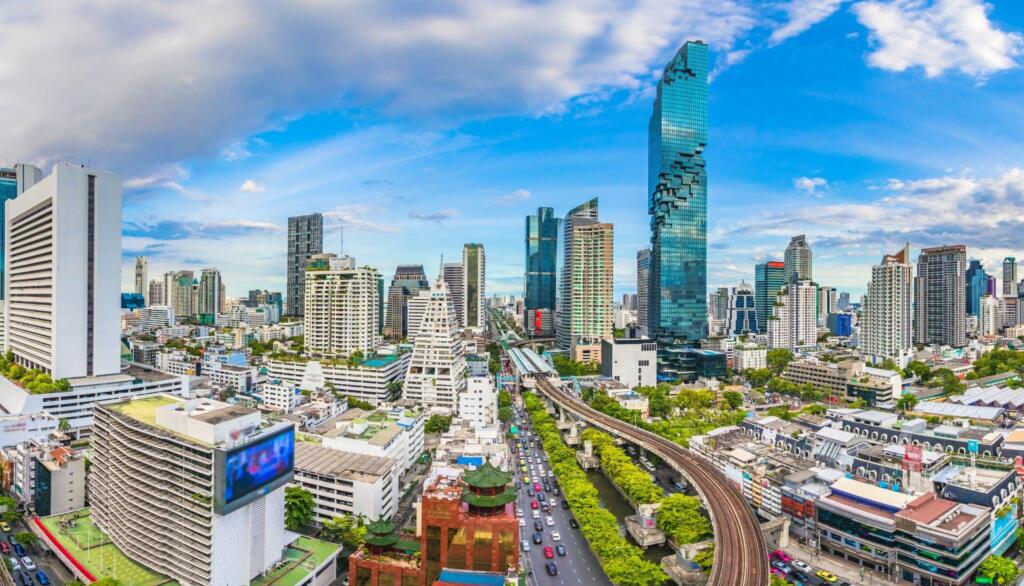
Here is an overview of Bangkok’s key aspects according to Nomad List:
| Key Aspects of Bangkok | Score |
| quality of life | Good |
| cost | Affordable |
| Internet speed | Fast |
| safety | Good |
| food safety | Good |
| lack of crime | Good |
| English speaking | Bad |
| walkability | Great |
| hospitals | Great |
| nightlife | Great |
| free Wi-Fi in the city | Great |
| places to work from | Great |
| friendly to foreigners | Great |
Let’s explore further what this location has to offer.
Geography
Bangkok is the capital of Thailand, located in Southeast Asia and bordered by Myanmar, Laos, the Gulf of Thailand, the Andaman Sea, Cambodia, and Malaysia. The city lies on the Chao Phraya River‘s delta, roughly 25 miles (40 km) from the Gulf of Thailand. Bangkok’s time zone is GMT +7, and its official 2000 census population was 6,355,144.
The city was formerly two separate municipalities, Krung Thep to the east and Thon Buri to the west, which united as a city province in 1971. In 1972, the city and two surrounding provinces merged into Krung Thep Maha Nakhon (Bangkok Metropolis).
Visa Application
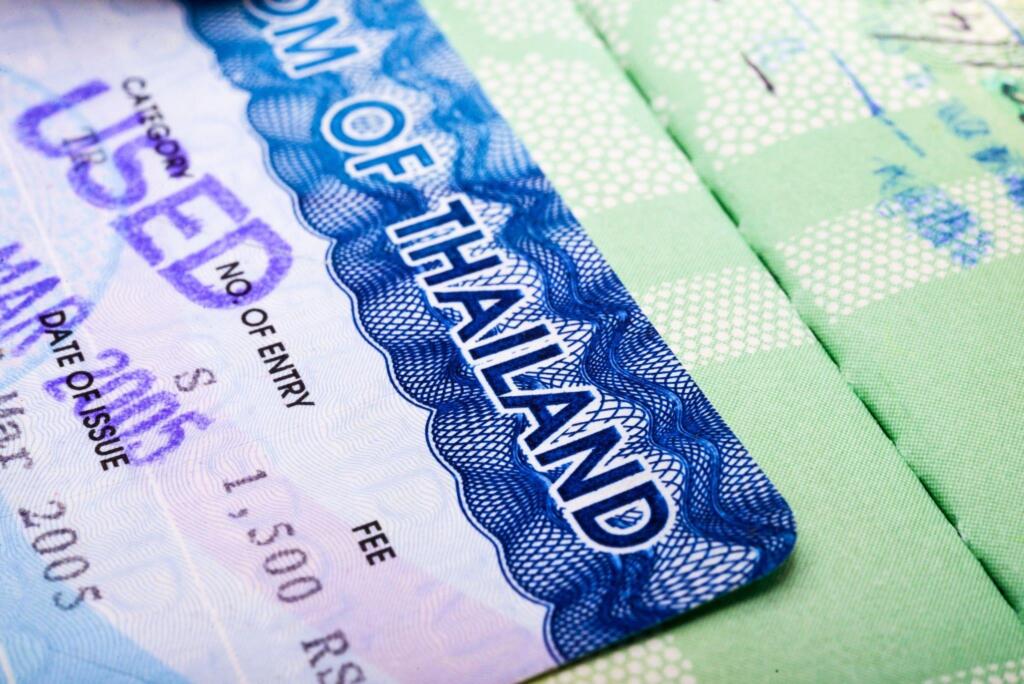
Thailand offers a range of visa options for digital nomads; however, it has a different kind of digital nomad visa than you may expect from several other countries. The type of digital nomad visa you’ll find is more of a long-term stay visa.
Long-Term Residency Visa for Digital Nomads
Bangkok’s 10-year long-term residency visa, created by the Thailand Board of Investments, is expressly targeted at wealthy digital nomads. The visa aims to attract high-earning and highly skilled professionals, wealthy global citizens (holding a minimum of USD 1 million in assets), wealthy pensioners (having a minimum personal income of USD 80,000/year), digital nomads (working for established overseas companies), and their families.
The goal is to boost Thailand’s economy by encouraging spending and investment.
Benefits of the Long-Term Residency (LTR) Visa in Thailand
The LTR Visa offers many benefits, including:
- Exemption from the country’s 4 Thais to 1 foreigner employment requirement ratio.
- Only one-year reporting at immigration instead of the typical 90 days.
- Fast track services at Thailand’s international airports.
- A multiple re-entry permit.
- A personal income tax rate of only 17%.
- A Digital Work permit.
- Tax exemption on your overseas income.
Eligibility Requirements for the LTR Visa
To qualify for the LTR Visa, remote workers must meet the following requirements:
- Have a personal income of USD 80,000+/ year for the past two years.
- In case of less income but no less than USD 40,000/ year for the past two years, you must have at least a Master’s degree, receive Series A funding, or own intellectual property.
- 5+ years of work experience in a relevant field of your current employment during the past ten years.
- You work for a listed public or private company that operated for 3+ years with minimum revenues of USD 150 million in that period.
- Health insurance with USD 50,000+ coverage, social security benefits insuring treatment within Thailand, or USD 100,000+ deposit.
The Application Process for an LTR Visa
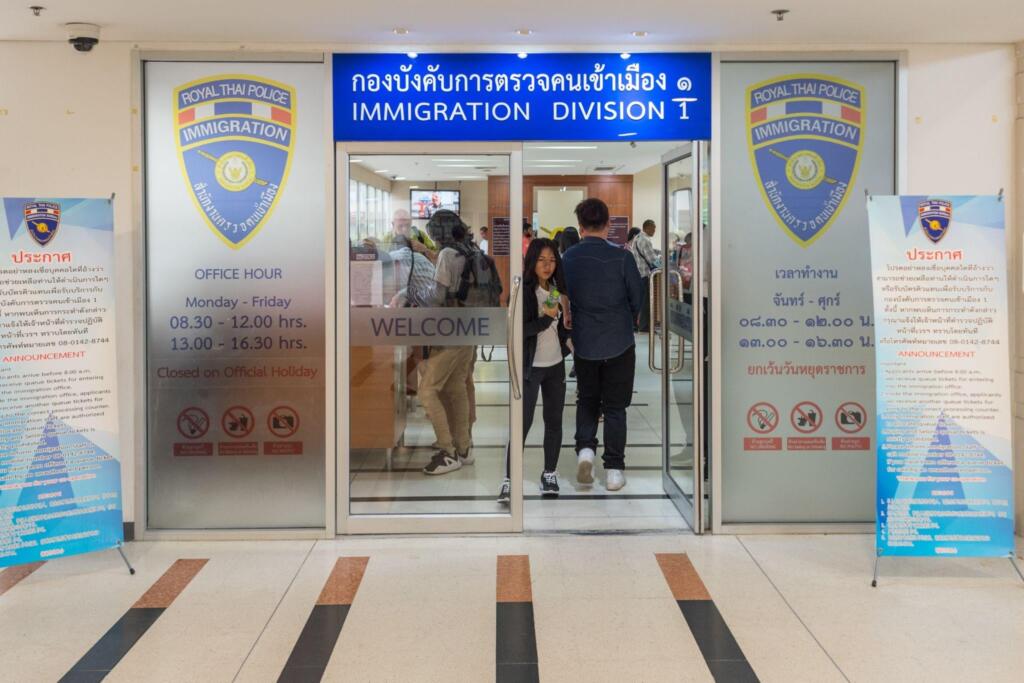
The LTR Visa application process involves four key steps:
- Application submission: Register and submit an application online for endorsement of your qualifications and supporting documents for the LTR Visa.
- Qualifications endorsement: The relevant Thailand agencies will review your application and the supporting documents. The processing time may take 20 working days or longer if additional documents are requested.
- Visa issuance: Qualified applicants will be notified of the qualifications endorsement result and must submit additional information and documents for pre-approval, which takes 1-3 working days. After the pre-approval request is approved, you’ll receive notification of your qualifications endorsement letter and can make an appointment for LTR Visa issuance.
- Work permit issuance: LTR Visa holders working for a Thai entity should apply for permission to work after receiving the LTR Visa or before employment with an entity in Thailand starts.
Cost
The processing fee for the LTR Visa is 50,000 Baht per person if collecting the visa in Thailand. However, getting it at the Royal Thai Embassies overseas or E-visa may cost more than 50,000 THB. Also, the work permit fee if working for local companies is 3,000 Baht per year.
Visa-Free Entry
Traveling to Thailand is easy, with visa-free entry for visitors from ASEAN and Western countries. This features 56 countries, including most Commonwealth, European, and North American citizens. Such visitors enjoy a visa waiver for up to 30 days in Thailand, granted upon arrival.
Visa-Free Entry Requirements
Under Thailand’s Tourist Visa Exemption scheme, visitors can stay for 90 days cumulatively (if leaving and re-entering) within six months.
To enter Thailand, you must have the following:
- A passport that’s valid for six months from first entry.
- Proof of adequate money for your stay (a traveler’s cheque or a cash amount of 10,000 Baht/ person or 20,000 Baht per family).
- Proof of onward travel, like confirmed air, bus, train, or boat tickets, to leave within 30 days after arrival. Failure to provide this documentation will necessitate a tourist visa.
Cost of Visa-Free Entry
The great thing about visa-free entry to Thailand is that it’s free of charge.
Visa on Arrival
Digital nomads can also obtain a visa on arrival, thanks to a new policy by the Ministry of Foreign Affairs of Thailand. Passport holders from 18 countries, plus the special economic zone of Taiwan, are eligible for the visa on arrival.
Among the countries included are:
| Andorra | Ethiopia | Maldives | Saudi Arabia |
| Bulgaria | India | Malta | Taiwan |
| Bhutan | Kazakhstan | Mauritius | Ukraine |
| China | Latvia | Romania | Uzbekistan |
| Cyprus | Lithuania | San Marino |
Requirements for the Visa on Arrival
Here are the requirements to qualify for this visa:
- Firstly, you must be a citizen of a country listed by the Thai Ministry of Interior.
- Your passport must have 30+ days of validity.
- The purpose of your trip should be at most 15 days.
- You should have a return ticket in 15 days.
- Provide a verifiable address in Thailand.
- Pay the visa fee in Thai currency only (non-refundable).
- Have 10,000 Baht per person or 20,000 Baht per family.
- Apply online.
Application Process for the Visa on Arrival
With the Thailand Visa on Arrival (VOA), you can apply online by completing the online application form. Alternatively, you can visit one of two service counters at the Suvarnabhumi airport right before immigration on the 2nd level. After completing the application, you’ll receive a Transaction Reference Number (TRN) to print and bring to Thailand for your visa to be stamped on your passport.
Fee
Since 27th September 2016, the visa fee has increased from THB 1,000 to THB 2,000.
Tourist Visa (Single Entry)
This visa is only valid for a single entry into the country. It’s also good for three months after issuance. Once in Thailand, you can stay for up to 60 days, with an extension possible for an extra 30 days, for a total of 90 days.
Requirements of the Single Entry Visa
You can get this visa by submitting the following:
- Two passport-size photographs from the last six months (with a light-colored background and no hats, dark glasses, or covered shoulders).
- A copy of your passport which won’t expire within six months.
- A round-trip flight confirmation.
- Your recent bank statement with $700+ or $1,500+ for a family.
- If necessary, hotel bookings or other accommodation arrangements.
- Non-US citizens will provide copies of permanent residence or valid US visas and proof of employment or full-time student status.
- Self-employed individuals to provide business licenses or registration.
Make sure that all documents indicate your name.
The application process for the Single Entry Visa
The application has a simple two-step process:
- Complete an Online e-Visa Application.
- Upload the necessary documents in PDF format.
Fee
The fee is $40 for a single-entry visa valid for three months.
Tourist Visa – TR-METV (Multiple Entries)
The TR-METV visa is valid for six months from issuance, and you must enter the country within the first three months. Each entry allows for a stay of 60 days, with the option to extend for an extra 30 days.
The application process for the TR-METV Visa
To apply, you should submit a complete online form plus the required documents to the Royal Thai Consulate-General within your country.
Requirements of the TR-METV Visa
For an Australian citizen applying for this visa, you’ll need to provide the following details:
- A completed visa application form.
- Your passport-sized photograph from the last six months.
- Your passport with two empty pages and a validity of at least six months from your planned entry date.
- Proof of adequate finances, such as a bank statement from the past six months with at least AUD 10,000.
Meeting these requirements will help ensure a smooth and successful visa application process. Note that the specific requirements may vary based on your country.
Visa fee
The visa fee is AUD 300 for Australians. You can make this payment by cash, debit, or credit card.
SMART Visa
Thailand’s SMART Visa aims to attract highly-skilled professionals, investors, and startup entrepreneurs to the Kingdom. Visa holders are eligible for four years of stay, an exemption from the work permit requirement, and additional privileges. The visa encourages people to work and invest in 13 sectors, including digital, automation and robotics, medical, and more.
There are five categories under which you can apply:
- Smart T: For science and technology professionals.
- Smart I: For investors.
- Smart E: For executives.
- Smart S: For startup entrepreneurs.
- Smart O: For your spouse and children.
The application process for the SMART Visa
To be eligible for this SMART Visa, you must meet specific criteria set by Thailand’s Board of Investment.
This means that your qualifications must be verified by government agencies. After receiving technical plus non-technical endorsements, the SMART Visa unit issues a letter of your qualification endorsement. You’ll then bring the letter of your qualification endorsement to the official Royal Thai Embassies or Consulates. If you are already in Thailand, go to the Immigration Bureau or the EEC Labour Administration Center.
Fee
The fee for this SMART Visa is 10,000 Baht/ year. Besides this processing fee for the Smart “S” visa, you’ll pay another 10,000 Baht when you request the visa.
Difficulty in visa application
Traveling to Bangkok as a digital nomad requires careful consideration of visa requirements. Previously, you could enter Thailand without proof of onward travel and extend your stay as long as you wanted by leaving and re-entering the country every month. However, recent changes limit visa waivers to three per six-month periods, requiring an appropriate visa or six months of absence before re-entry into the country.
Additionally, overstaying a visa, even for several hours, can result in severe consequences, including arrest and detention at an Immigration Detention Centre. To avoid these issues, plan ahead and obtain a proper visa extension or do the visa run before the expiry of your visa.
Neighborhoods popular with digital nomads
A wide range of neighborhoods within Bangkok are suitable for digital nomads. From the diverse selection, you’re sure to find an option that suits your tastes and budget.
Sukhumvit
For digital nomads with a healthy budget, the Sukhumvit area would be an ideal place to live. Dubbed the “great dame” of Bangkok life, Sukhumvit boasts premium real estate and is a hub for shopping and nightlife.
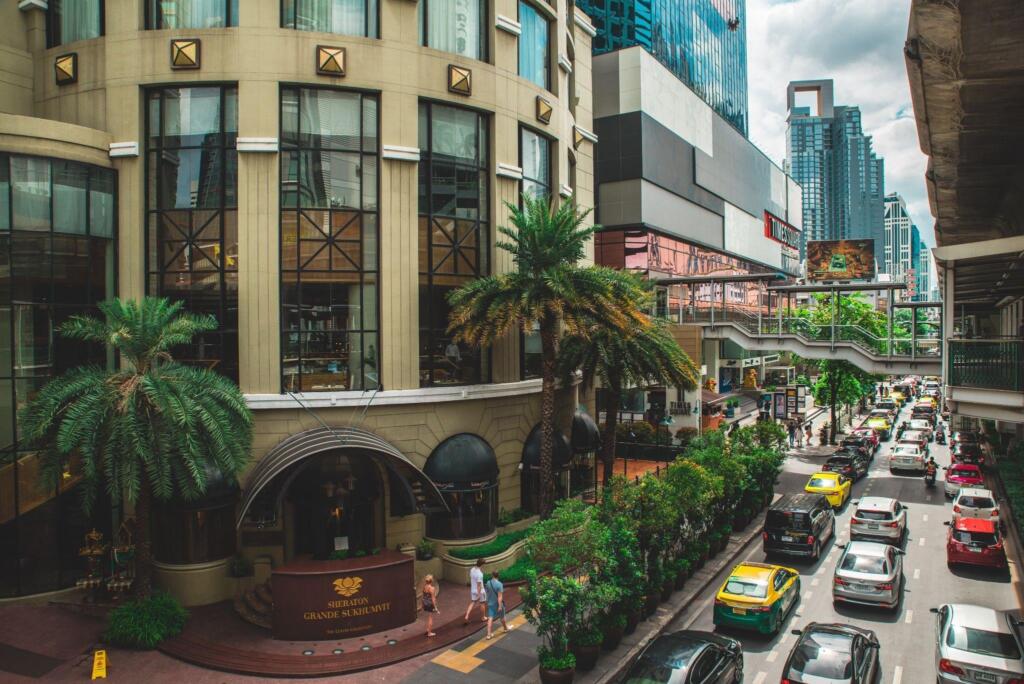
Central Sukhumvit is the prime location for those seeking a city center experience similar to London, Paris, or New York. It’s also an ideal spot for remote workers, with numerous cafes and co-working spaces, making it easy to work and socialize with like-minded individuals.
Despite being a bustling area, Sukhumvit is still a relatively safe place to live, with many expats and locals choosing to make it their home. The neighborhood offers a wide range of accommodation options, from high-end luxury apartments to more affordable alternatives.
Asok
Asok is a famous meeting point within Bangkok, making it an ideal location for any digital nomad. It’s home to the well-known Makkasan Airport Link, providing transportation to and from Suvarnabhumi International Airport. It also has easy access to the BTS station plus the underground MRT, for traveling to other areas of Bangkok.
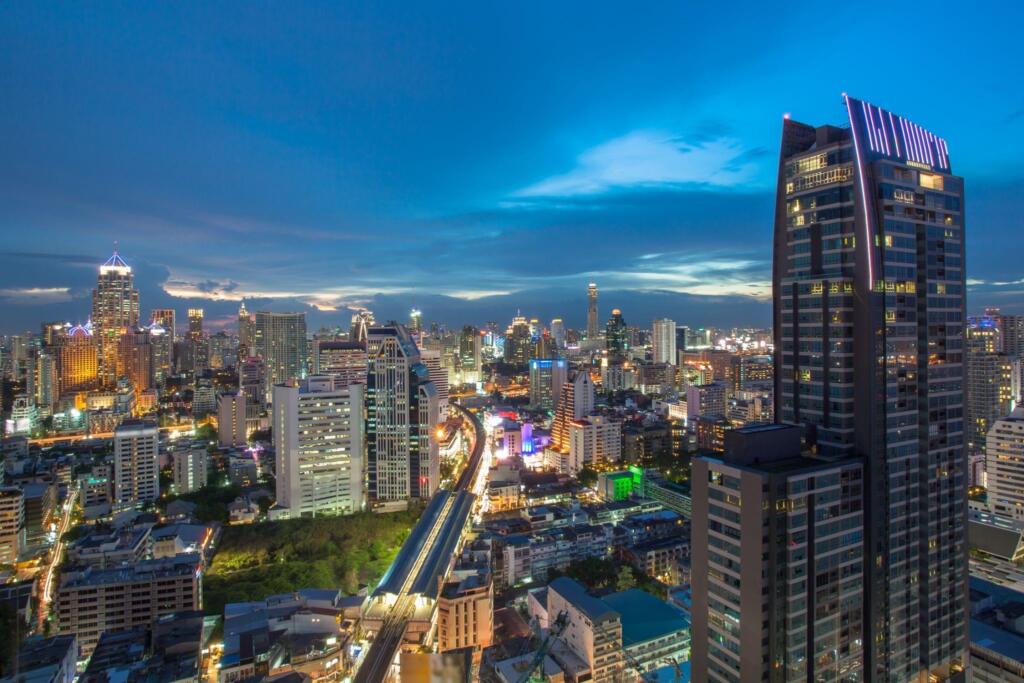
Apart from accessibility, Asok also boasts several highlights worth exploring: from hip galleries to new shops, Benja Kitti Park, Terminal 21 Mall, and Queen Sirikit Convention Center. The area has many events and fairs, and there are plenty of activities to keep digital nomads entertained.
Victory Monument
If you prefer a less touristy area with convenient public transportation plus a central location, look no further than Victory Monument. This area is right on the BTS line and offers various apartment prices to suit different budgets.
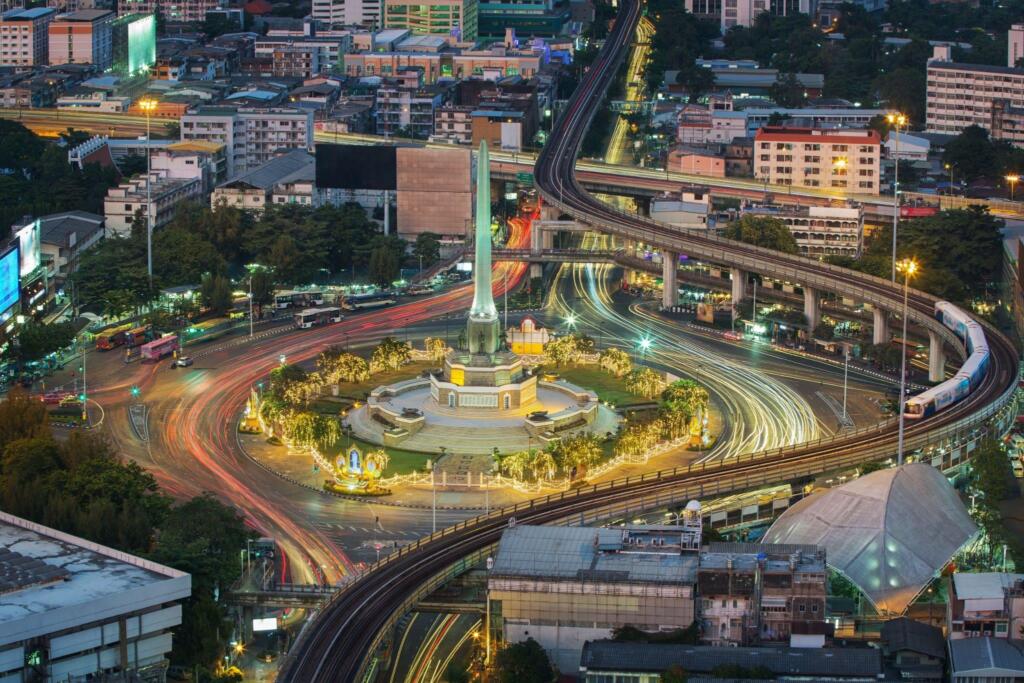
Victory Monument is popular with young professionals, students, and a growing expat community. It boasts the iconic Victory Monument at the center of a huge roundabout and the serene Santiphap Park, offering a green escape from city life. For shopping enthusiasts, the area also features a street market.
Ari
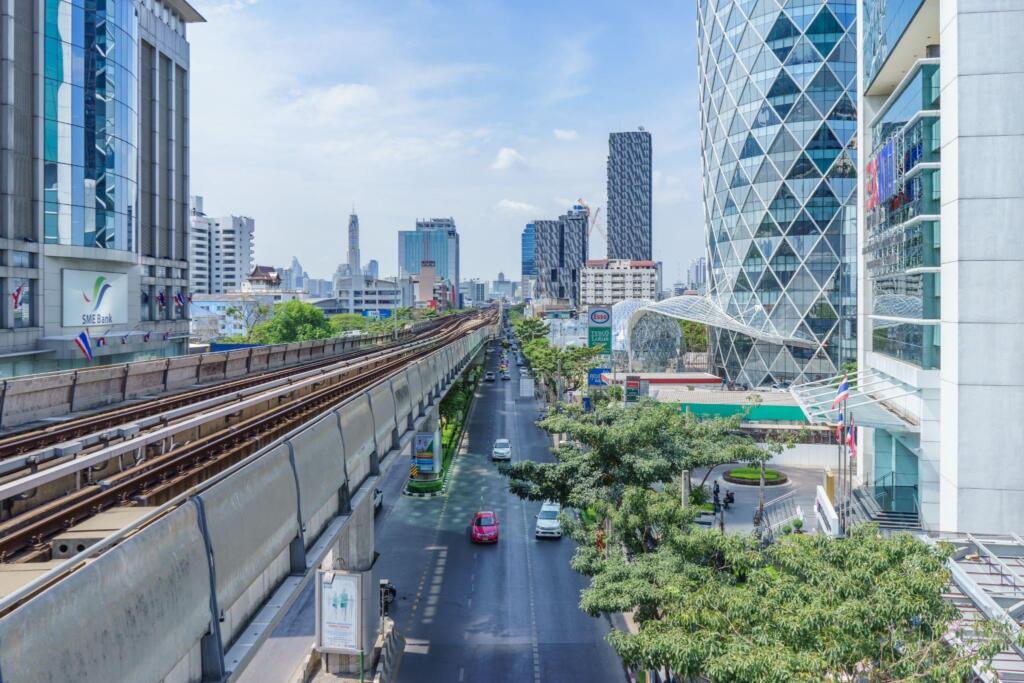
Another neighborhood that has become popular with expats is Ari. Located on the city’s BTS line, Ari is one great place to experience the authentic Thai neighborhood while being in the city center. The neighborhood is known for its artsy vibe, with murals and street art lining the streets. In addition, numerous authentic Thai restaurants have existed there for generations.
Ari is an excellent choice for a digital nomad who wants to experience Bangkok without a fast-paced lifestyle. The neighborhood is much cleaner, quieter, and greener than other central areas.
Cost of living and cost of living arbitrage
Bangkok can be an excellent destination for any digital nomad on a budget. With an average cost of living index of 49.8, it’s considerably cheaper than many cities worldwide, such as New York or Zurich. According to Thailand’s Tourism Ministry, you can live on 500B per day in Thailand, especially when eating local food and taking local transportation. Visitors staying in comfy hotels and eating out at restaurants can budget around 600-1,000 Bhat a day outside Bangkok or double the amount in the capital.
Numbeo offers a further comparison of living costs between Bangkok and other cities. For example, you’ll need around USD 3,321.6 (113,838.8฿) within Bangkok to get the same living standard as USD 9,100.0 in New York, NY (if you rent in both cities).
Consumer prices in Bangkok are also 50.2% lower compared to New York City without rent, and rent prices are 77.7% lower compared to New York City. Additionally, restaurant prices within Bangkok are 74.8% lower than in New York City, making it a budget-friendly destination.
Here is an overview of various grocery prices in Bangkok compared to New York:
| Items | New York, NY | Bangkok | Difference |
| Domestic beer (0.5 liters) | $8.00 (฿274.18) | $2.33 (฿80.00) | -70.8 % |
| Milk (1 liter) | $1.26 (฿43.18) | $1.72 (฿59.00) | +36.7 % |
| Loaf of white bread (500g) | $4.20 (฿143.93) | $1.84 (฿63.04) | -56.2 % |
| Beef (1kg) | $19.68 (฿674.64) | $13.11 (฿449.15) | -33.4 % |
| Apples (1kg) | $5.80 (฿198.83) | $2.99 (฿102.65) | -48.4 % |
| Water (1.5 liters) | $2.45 (฿83.92) | $0.48 (฿16.56) | -80.3 % |
Accommodation
Bangkok is an ideal destination for affordable housing too. Thailand’s off-peak season from May to August is typically the best time to get good deals on accommodation. However, prices from December to February can be high during the cool season.
There are many accommodation options to choose from for all budgets. Budget travelers can find a dorm room for as little as 100 B per day, or multi-bed private rooms for 1,000 B per day. Luxury hotels are available from 5,000 B (USD 150) per night.
Apart from hotels, digital nomads can also choose homestays with the local villagers, guesthouses in backpacker districts, or beach bungalows. Regardless of where you decide to stay, book ahead of time.
Here are the typical rent prices within and outside the city:
| Accommodation | Rent Per Month |
| 1-bedroom apartment in the city center | $651.51 (฿22,328.95) |
| 1-bedroom apartment outside the city center | $310.23 (฿10,632.35) |
| 3-bedroom apartment in the city center | $1,956.39 (฿67,050.90) |
| 3-bedroom apartment outside the city center | $1,001.77 (฿34,333.33) |
Co-living spaces
Bangkok features several excellent co-living spaces.
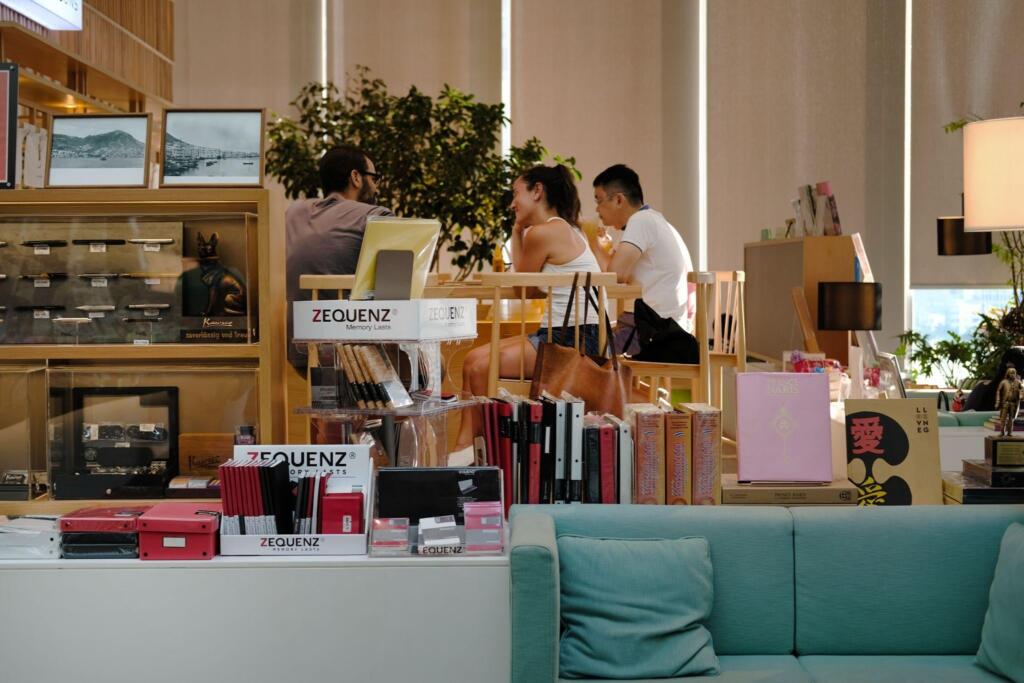
Here are some of the notable options:
- LITA Bangkok: Located at 306/6 Kiatti Chai Alley, Asok-Din Daeng Road, Din Daeng, Bangkok, Thailand. They offer three types of private studios and a dormitory with a shared bathroom. You’ll also access spacious common areas like living rooms, cafeterias, co-working spaces, laundry areas, and the smoking terrace. Their Twin Studio With Balcony accommodates a maximum of two guests with prices starting from ฿1,400.00.
- UnionSPACE, Bangkok: Their Thai locations include: Ekkamai, Ratchada, Chit Lom, and Silom (all in Bangkok). With their ‘Work & Stay Packages,’ a work pass offers 24-hour access and 24-hour internet access (3 devices) for 600 Baht per person per night for 1 – 3 people.
Utilities
In this city, you can expect all the modern amenities and infrastructure. For an 85 m2 apartment, expect to pay USD 78.66 monthly for essential utilities, including electricity, heating, cooling, water, and garbage disposal.
For your mail, the Thailand postal service is reliable and efficient, with many branches in most of the major towns, including Bangkok. The Central GPO in Bangkok opens until 6 pm on weekdays and 9 am-1 pm on weekends. Besides, most major hotels will mail letters or parcels for you. While tap water is typically drinkable, bottled water is preferable.
Groceries
The city has shopping malls and markets to buy various grocery items. Some of the best places to buy groceries in Bangkok include:
- Gourmet Market, located at Siam Paragon (G Fl), in Pathum Wan, Bangkok
- Lemon Farm, located at The Portico (1st Fl.), in Pathum Wan, Bangkok
- Big C, located at 97/11 Ratchadamri Rd. (near the Ratchaprasong Intersection), in Pathum Wan, Bangkok
And these are the typical prices you can expect to pay for groceries:
| Item | Price |
| milk (1 liter) | $1.73 (฿59.00) |
| loaf of white bread (500g) | $1.84 (฿63.04) |
| white rice (1kg) | $1.53 (฿52.29) |
| 12 eggs | $2.00 (฿68.32) |
| cheese (1kg) | $17.17 (฿587.27) |
| beef round (1kg) | $13.13 (฿449.16) |
| apples (1kg) | $2.97 (฿101.62) |
| oranges (1kg) | $1.97 (฿67.34) |
| potato (1kg) | $1.59 (฿54.40) |
Best co-working spaces
In Bangkok, you can pay roughly $198/ month for a co-working hot desk. The Nomad List community ranked Hubba as the best co-working space and The Hive as the best alternative co-working space.
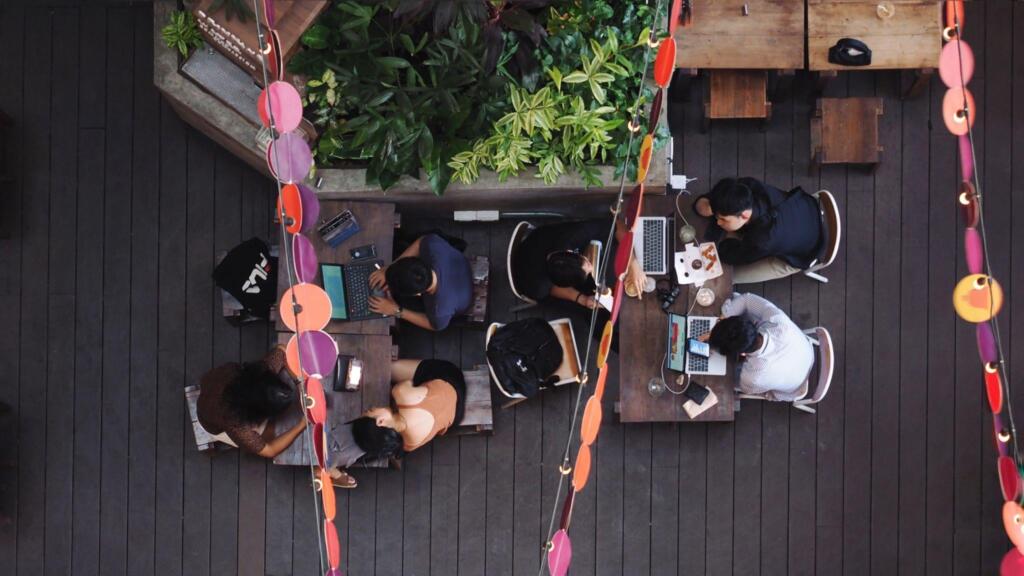
Let’s explore some of these co-working spaces further:
- The Hive: Located in Thonglor, Bangkok, at Piman 49, just off Sukhumvit Road. They occupy seven floors with hot desks, dedicated desks, a conference room, meeting rooms, and a rooftop café lounge. The hot desk is priced from THB 4,000 per person/ month.
- Hubba: They have Sathorn and Vibhavadi branches with hot desks, meeting rooms, private offices, virtual offices, and event spaces. Here, you can expect to pay 70 baht/hour.
- Launchpad: Located in the Heart of Silom, 5 minutes from Surasak BTS station. The prices start from 350 baht/day.
Other options include Glowfish and WorkWize.
Crypto community

Thailand is ranked second globally in crypto adoption, with 9.9% ownership by Thai Internet users. This means that Bangkok, the Thai capital, has a well-established crypto community, especially since many Thai investors are interested in the crypto market.
Size of the local crypto community
Bangkok has become a hotspot for digital nomads who are interested in cryptocurrencies. According to research conducted by Recap, Bangkok is in the 10th position of the largest crypto hubs worldwide. The Thai capital attracted about 57 crypto companies and is becoming increasingly popular among crypto enthusiasts.
Roughly 4.3 million people, 6.47% of the country’s total population, own cryptocurrency. This is a significant number, and it demonstrates the growing interest in cryptocurrencies in Thailand. Digital nomads can also take advantage of various Meetup groups focusing on cryptocurrencies to connect with like-minded individuals, network, and learn more about cryptocurrencies.
The legal status of crypto
Although not considered legal tender, cryptocurrencies are “digital assets” under Thailand’s Royal Decree on Digital Asset Business. They can be issued, traded, and exchanged by digital asset business operators (but not used for payments). The Royal Enactment on Digital Asset Businesses further regulates cryptocurrency brokers, exchanges, and dealers. They should obtain licenses from Thailand’s Securities and Exchange Commission. However, local banks or financial institutions are barred from direct involvement in cryptocurrency transactions.
Thailand was among Southeast Asia’s first countries to enact cryptocurrency legislation by legalizing the trading of 7 approved digital currencies. Even so, staying up-to-date with any regulation changes would be best to ensure compliance.
Crypto startups based in Bangkok
Bangkok is a hub for Southeast Asia’s cryptocurrency business. According to reports, Thailand ranks second in the ASEAN region for blockchain technology and Bitcoin investments.
Bitkub, Thailand’s cryptocurrency exchange, leads the market with annual trading volumes of USD 28.6 billion in 2022.
The other Thai exchanges include:
| Thailand Crypto Exchange | Total Trading Volume (USD) | Market Share |
| Bitkub | $28,625,420,529 | 75.44% |
| Zipmex | $5,609,036,365 | 14.78% |
| Bitazza | $3,234,721,648 | 8.52% |
| Satang Pro | $475,565,247 | 1.25% |
The city even has a Web3 non-custodial Bitcoin hedging service called Fundsy.
Moreover, the crypto market growth has led to the establishment of cafes like Hip Coffee & Restaurant and The Moon: Crypto & NFT Café. These cafes have become crypto community spaces, offering food, beverages, desserts, and crypto payment options. At Hip, customers pay through the Binance app; at The Moon, they use the Satoshi app’s wallet.
At The Moon, people can also attend classes such as Kao Raek Sue Crypto, aimed at beginners who want to learn about crypto, Bitcoin, and blockchain technology. Additionally, The Moon boasts five screens for displaying NFT arts (purchased using QR codes) and another five for showcasing crypto play-to-earn games.
Taxation on cryptocurrency
Current tax exemptions for digital assets may make Thailand an even more appealing destination. In March 2023, Thailand’s cabinet waived value-added and corporate income tax for companies issuing digital tokens for investment. Additionally, a trader can now offset an annual loss against gains regarding taxes on cryptocurrency investments. Also, you benefit from an exemption on the value-added tax of 7% on cryptocurrency trading only on authorized exchanges.
Note that only profits from trading in cryptocurrency or digital tokens and from farming digital tokens are subject to withholding tax.
Nomad community
Bangkok is a favorite destination among digital nomads worldwide, with approximately 1.94% visiting the city. Based on the world’s 35 million digital nomads, this equates to an estimated 679,000 digital nomads visiting Bangkok, making it the second-best city in the world for digital nomads.
The city’s appeal stems from its delectable local food, over 15,000 high-speed Wi-Fi spots, stellar transportation options, and cheap accommodation, with an average of $33 per night for an Airbnb. With its unique blend of culture, entertainment, and modern amenities, Bangkok is a must-visit for digital nomads seeking adventure and inspiration.
Local nomad job opportunity
If you have a Long-Term Residency Visa, you can work locally. Otherwise, you’ll need a work permit if you only have a tourist visa.
Nomad List provides a helpful suggestion of remote jobs that can cover the city’s cost of living, including:
To find the best job offers, you can check through the most popular job sites in the country, including:
Popular recreational activities and fun spots
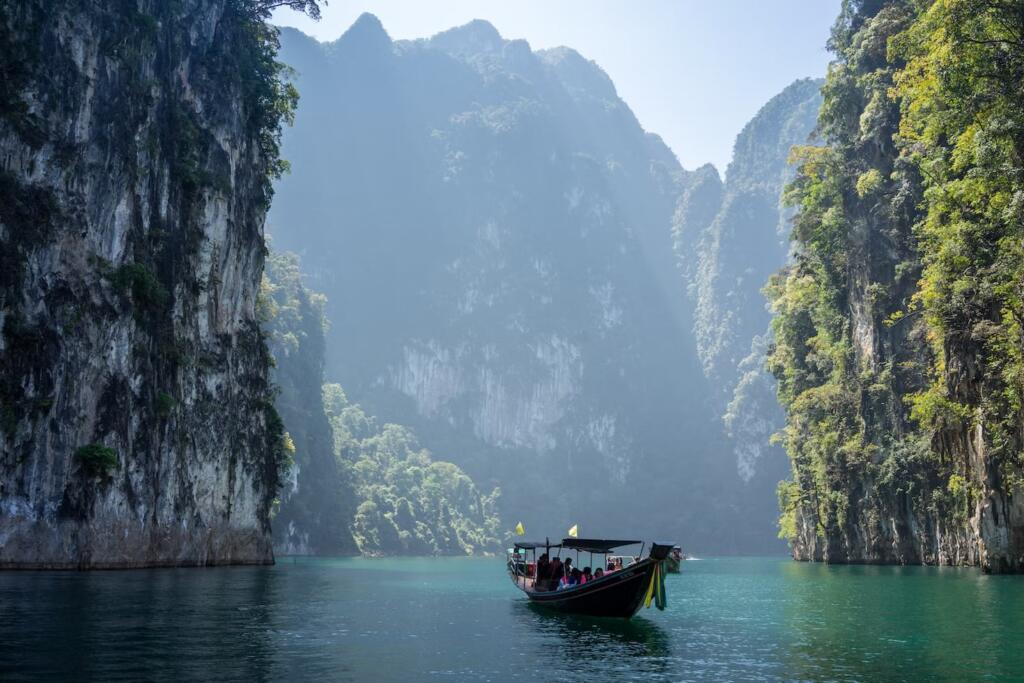
Khao Sok National Park, Khlong Sok, Thailand.
Bangkok attracts a growing number of tourists yearly since it offers a blend of cultural and natural wonders. Visitors can indulge in various cultural events, Thai boxing, Thai cooking classes, and meditation. Those who seek adventure can engage in mountain biking, white water rafting, trekking, rock climbing, and bird-watching.
You can enjoy Thai culture by attending festivals and entertainment activities like the Loy Kratong holiday. If you prefer a more relaxed experience, Bangkok offers various boat, cruise, helicopter, or national park tours. Furthermore, you can rejuvenate with yoga, Thai massage, and Buddhist meditation.
The city has a lot of historical and religious sites like Wat Phra Sri Rattanasamaram, Wat Phra Chetuphon Wimon Mangalaram, and Wat Arun Ratchawararam. Besides, several other interesting palaces, museums, parks, and markets (including Yaowarat, Sampeng Market, Chatuchak Weekend Market, and Phahurat night market) exist.
Transportation
Many transportation options are available for locals and visitors, whether by land, air, or boat. This includes rail, electric trains, underground trains, buses, taxis, boats, and airlines.
Bangkok BTS Skytrain
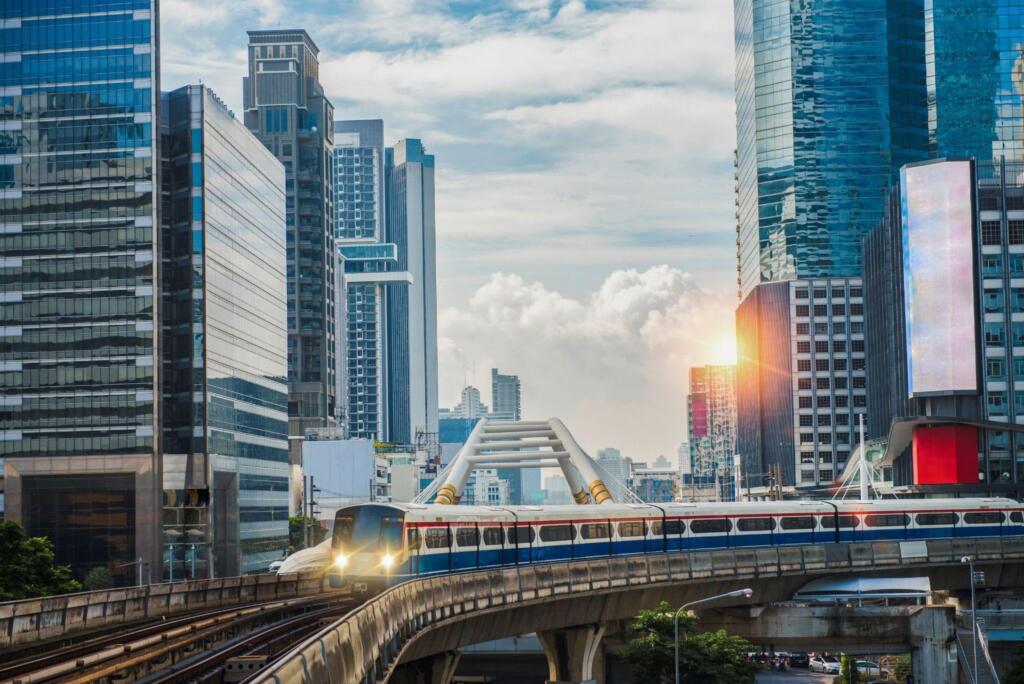
The Bangkok BTS Skytrain offers both comfort and convenience. It’s an elevated electric rail system, often called a “sky train.” Since its inception in 1999, it has become a preferred mode of transportation for both locals and visitors. The sky train offers a comfortable and safe ride through Bangkok, lifting commuters high above the congestion and noise of the streets.
Whether exploring the city or simply commuting, the sky train is an excellent option. With 60 stations and routes connecting the city’s major hubs, it provides easy access to Bangkok’s famous landmarks and shopping districts.
Underground Bangkok MRT Subway
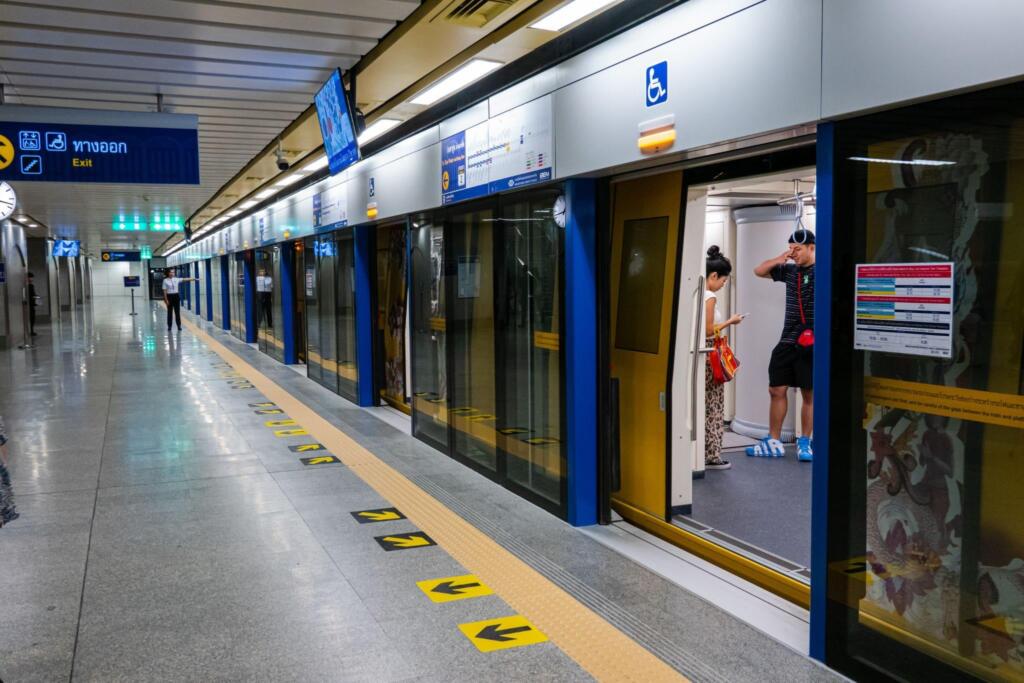
The city’s modern transportation system includes electric underground rail lines that make traveling comfortable and convenient. This Underground Bangkok MRT Subway has the Purple Line and the Blue Line.
The MRT Purple Line runs for 23 kilometers with 16 elevated stations. It starts from Khlong Bangphai and ends at the Tao Poon station, where passengers can interchange with the Blue Line Extension. The MRT service runs about 21 trains and offers an adult pass lasting 60 days for 60 trips at 1,200 Baht, with a typical maximum fare rate per trip of 42 Baht.
The MRT Blue Line Project comprises 38 stations and covers 48 kilometers. It has two segments: the Chaloem Ratchamongkhon Line, Thailand’s first underground metro system, and the Blue Line Extension. The latter has 11 stations, including four underground and seven elevated stations. Passengers can purchase adult passes lasting 30 days for 50 trips at 1,250 Baht, with a typical maximum fare rate per trip of 43 Baht.
The total MRT service runs about 54 trains.
Passengers planning to use the Purple and Blue Lines can opt for Multiline adult passes lasting 30 days for 50 trips at 2,250 Baht, with a typical maximum fare rate per trip of 71 Baht. With these options, digital nomads can travel around Bangkok quickly and affordably.
Airport Rail Link
Bangkok’s Airport Rail Link operates daily with a maximum of 160 kilometers per hour speed on elevated tracks parallel to the eastern railway. It covers about 28 kilometers, passing through eight stations:
- Phyathai Station
- Makkasan Station and City Air Terminal
- Rajprarop Station
- Hua Mark Station
- Ramkhamhaeng Station
- Thab Chang Station
- Suvarnabhumi Station
- Lad Krabang Station
If you’re traveling to Suvarnabhumi Airport, you have three options:
- The SA Express: Transports passengers from the City Air Terminal/ Makkasan Station to Suvarnabhumi Airport in 15 minutes without stopping.
- SA Express (the new express route): From Phyathai Station to the Suvarnabhumi Airport in 20 minutes without stopping.
- City Line: Transports passengers between the Phyathai Station and the Suvarnabhumi Airport in 30 minutes, stopping at every station.
The Airport Rail Link connects to the MRT (subway) at Makkasan Station and connects to the BTS (Skytrain) at Phyathai Station.
Railway
A great way to explore Bangkok and the surrounding regions is by railway. Thailand’s railway has several routes covering 4,346 miles, connecting different cities and regions.
- A northbound line to Chiang Mai.
- The southbound line to Narathiwat and the Padang Besar Station.
- An eastbound line to Sa Kaeo and the Ta Phut Industrial Estate.
- A northeast line to Nong Khai and Ubon Ratchathani.
- The westbound line to Kanchanaburi.
- The Mae Klong Wong Wien Yai part-Mahachai line.
Additionally, there are plans to develop the east coast by constructing several new routes.
Boat
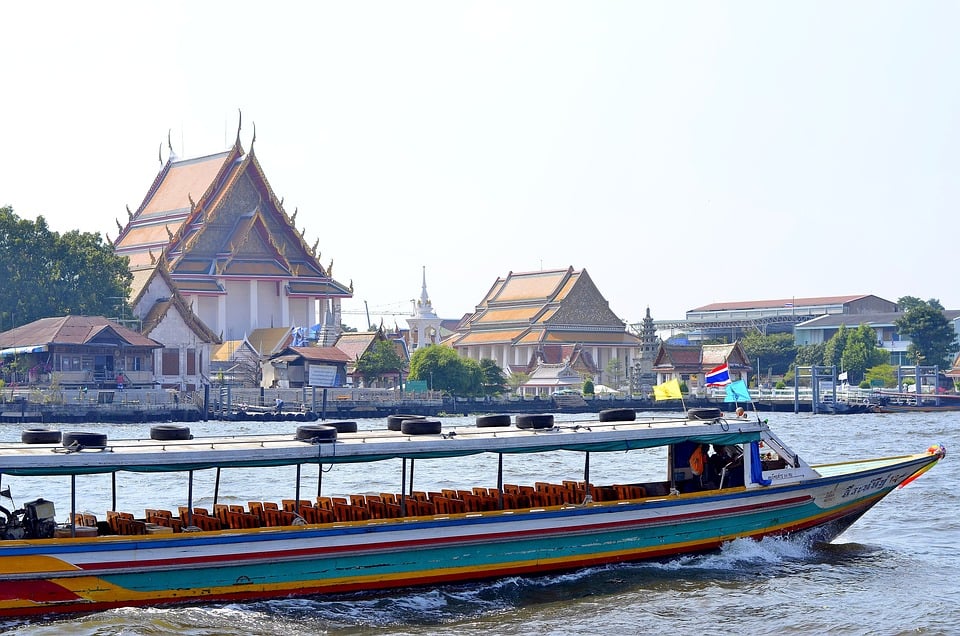
Thai boat.
Bangkok is the “Venice of the East” due to its many rivers and canals. Taking advantage of the natural location, long-tail boats are a popular mode of transportation. This allows for easy travel along the waterways of Bangkok and neighboring provinces.
Riverboats move on the Chao Phraya River, with about 20 main stops. These boats can be quicker than a journey by road. At the piers (marked in both English and Thai), there are cross-river services costing 2B or 3B and longer trips going for 10B (USD 0.25). Buy the tickets at the pier or on the boat.
Besides using boats for transportation, visitors can also take river cruises or enjoy snorkeling, fishing, and squid fishing along Thailand’s long coastlines.
Taxis
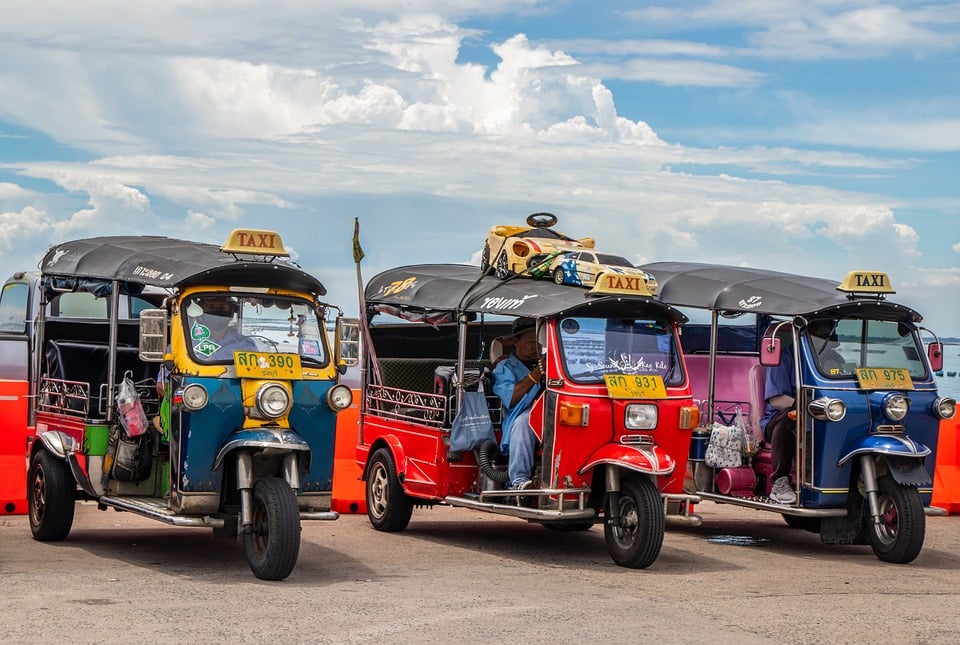
Tuk Tuk taxis.
Metered taxis are a fast way to move around. Such taxis are available at any time of day or night, especially at airports. The flag-down rate is 35 Baht for the first two kilometers and approximately 5 Baht for every kilometer afterward. Passengers should expect to pay additional toll fees when using the expressways.
Alternatively, visitors who prefer a more adventurous ride can opt for a Tuk Tuk or motorcycle taxi. Tuk Tuks are three-wheeled motorcycles that have become symbols of Thailand. Meanwhile, motorcycle taxis are ideal for short distances and are found at street intersections or small alleys.
If you want more independence, car, and motorcycle rentals are available. Local companies and international chains provide these rental services. Some companies even offer drivers. These companies are usually located at airports and train or bus stations.
Buses
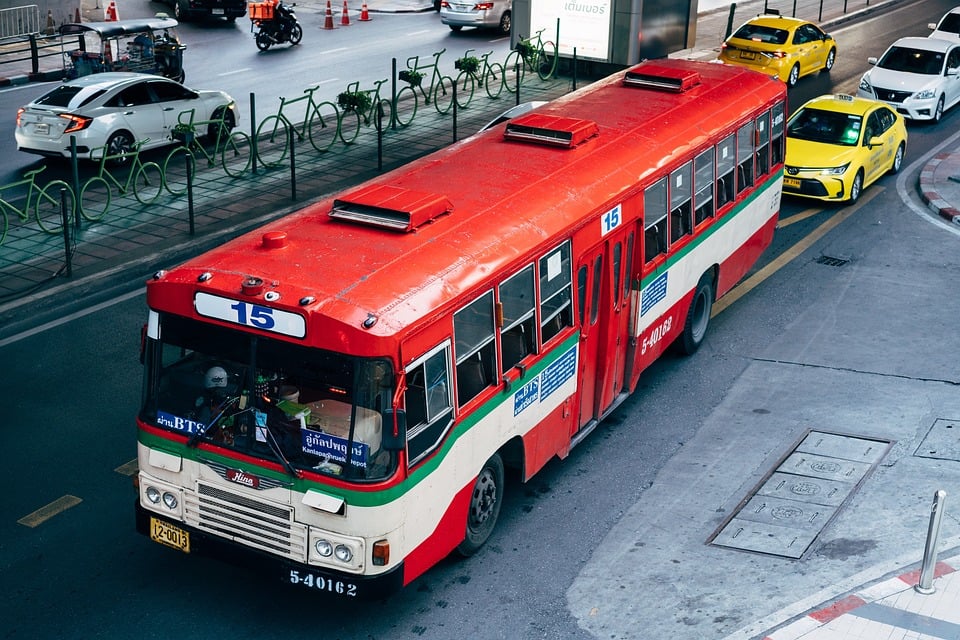
Bangkok bus.
Buses are another popular and inexpensive mode of transportation in Bangkok.
There are three main bus terminals in Bangkok:
- Ekkamai Station: Located on Sukhumvit Road and serves Eastern Thailand.
- Mo Chit Station: The terminal station for Central, Northeast, and Northern Thailand.
- Sai Tai Mai Station: Serves Southern Thailand.
Airlines
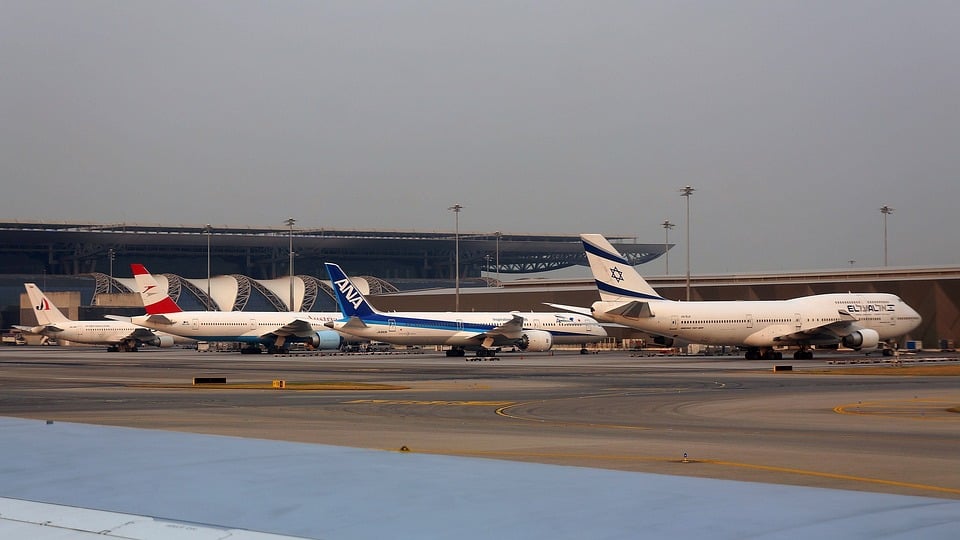
Passenger plane Bangkok.
There are numerous domestic airlines from Bangkok to provincial capitals, with two main airports: Don Mueang International Airport and the Suvarnabhumi International Airport. Don Mueang International Airport has a rich history, as Thailand’s first airport started in 1914. On the other hand, Suvarnabhumi International Airport is a relatively new airport that officially opened in 2006.
Overall, Thailand is served by about 156 international airlines:
- 9 Air
- Aero Thai
- Aeroflot Russian Airlines
- AHK Air Hong Kong
- Air Alsie
There are also seven domestic airlines, including:
- Bangkok Airways
- Nok Air
- Thai AirAsia
- Thai Airways
- Thai Lion Air
- Thai Smile
- Thai Summer Airways
For those who prefer privacy and independence, private plane rentals are available.
State of roads and traffic
Thailand’s road system is well developed with clear traffic signs helping you navigate.
Driving on the left is mandatory, so most cars have right-hand drive steering wheels. If you plan to drive, carry an international driving license, but your license from home may suffice. Remember, driving while intoxicated is prohibited.
In Bangkok, be prepared for heavy traffic and an aggressive driving style. Motorcycles and cars may maneuver against one-way traffic on small alleys or rural roads. Therefore, defensive driving is critical to avoid oncoming traffic.
Security/ safety
Bangkok is relatively safe for tourists and digital nomads. The Tourist Police provide safety for tourists. Over 500 are located in key tourist areas. However, be aware of common scams that may affect travelers.
The crime rate, especially among expatriates
Thailand has a fair share of scams, and expatriates should know the most common ones to avoid them. The most common scams involve tuk-tuk drivers offering to take travelers to sites with outrageous prices. And jewel shop scams, where travelers lose large sums of money buying seemingly cheap smuggled Burmese gems, only to discover they are fake and the shop’s gone when they return.
Dos and Don’ts
Avoiding tuk-tuk drivers who offer their services before being asked, especially near major tourist attractions, is recommended. It’s also advisable to avoid buying sightseeing tours at airports and be wary of befriending strangers too quickly.
Moreover, avoid getting involved with illegal drugs. Lastly, travelers should not get overtly drunk on the trains as intoxication can leave you prone to robberies and falling out of train doors.
Follow these dos and don’ts to stay safe and secure:
- Keep copies of your important documents, such as passports, credit cards, and traveler’s cheques.
- Have a list of important phone numbers.
- Most hotels offer safety deposit boxes, so use them.
- Use a money belt always to keep your cash and important documents close to you.
- Be aware of your surroundings.
- Avoid leaving your phone or camera unattended at a restaurant or bar.
- Keep your purse or bag on your lap or a hook rather than on the floor beneath your seat.
- Only take something out with you if you can afford to lose it.
- Leave your expensive jewelry and watches in the house.
- Please DON’T walk around with your wallet or phone in your back pocket (keep them in a front pocket or a bag that you can hold close to your body).
By following these simple guidelines, you can have a safe and enjoyable time as a digital nomad in Bangkok.

Generally, Thai people value politeness, and Buddhism influences their behavior. Therefore, avoid confrontations at all costs, as Thai society is non-confrontational. Losing your patience or showing anger is considered a weakness.
The dress code is essential, and it’s advisable to dress smartly and neatly. Shorts, low-cut dresses, or bathing suits are considered improper attire in Thailand. Preferably, wear long skirts or trousers when visiting temples.
How you might be expected to behave
When in Thailand, you’ll need to observe several vital behaviors. Avoid touching someone’s head, as the head is the highest body part, and touching it is considered disrespectful. The feet are the least sacred, so it’s insulting to point your feet at anyone or to kick them. Avoid shaking hands, and use the traditional greeting ‘Wai’ (bowing).
Also, public displays of affection are frowned upon. Note that women shouldn’t touch monks directly.
Cultural dos and don’ts
Familiarizing yourself with local cultural norms is essential to avoid unintentionally offending locals.
To fit in, observe these dos and don’ts:
- Bargaining is expected in most places in Thailand, but good manners plus a sense of humor are appreciated. You can get a 10-40% reduced cost on the original asking price with patience and a smile.
- Taxi drivers and porters appreciate small tips of 20-50 baht.
- Leaving coins as a tip in restaurants is customary for locals, but adding 20-100 baht is appreciated, especially in upscale establishments where the service is exceptional.
- When entering a foreign culture, it is easy to make mistakes. If you do so, smile or ‘Wai,’ and you will be forgiven. Remember, conflicts can be easily resolved with a smile in Thai culture.
- When visiting temples or other religious sites, dress conservatively, and remove your shoes before entering.
Following these tips and familiarizing yourself with Thai customs can ensure a smooth and enjoyable trip.
Political and economic stability
Thailand has a score of 29/100 in terms of overall freedom, according to Freedom House’s 2022 report. After five years of military dictatorship, the country has a military-dominated, semi-elected government. The country is a constitutional monarchy, with King Maha Vajiralongkorn as head of state. While the monarchy has limited formal power, the king has significant influence in Thai politics, especially over the military.
The country’s constitution was approved in a 2016 referendum. The prime minister gets selected by majority vote from a 500-seat elected House of Representatives plus a 250-seat Senate appointed by the military.
Being aware of the country’s political situation can help you enjoy all the city offers while remaining safe and informed.
The nature of politics and government
In 1932, Thailand transitioned from an absolute monarchy to a democratic system (the king serves as the Head of State). Bangkok is one of only two administrative areas where citizens vote for their Governor. The city also hosts various United Nations agencies, including the International Labour Organisation and the World Health Organization.
The Bangkok Metropolitan Area goes beyond the Bangkok province, with urban sprawl into neighboring regions. This province was set up in 1972 when the original Bangkok province merged with Thonburi. And the city has 50 districts, further divided into 154 kwaeng. A chief runs each district, while the Bangkok Metropolitan Council oversees municipal ordinances plus the city’s budget.
Economic indicators
The city’s economic indicators show a thriving economy, with total revenues of about 20.7 billion Thai baht in 2021. Bangkok is the country’s economic center, producing roughly a third of the country’s output, with nearly half of all Thai firms located in the metropolitan area.
This city’s manufacturing industry primarily focuses on textiles, food processing, electronic equipment assembly, and building materials. To reduce congestion, industrial parks were established on the outskirts of Bangkok beginning in the mid-1970s. Tourism has grown substantially in recent years and is now a significant source of revenue for the city.
Bangkok also houses a third of the country’s banking units and holds three-fourths of all deposits. The Board of Investment, the Industrial Finance Corporation of Thailand, and the Securities Exchange of Thailand are all located in the city, making it a financial hub in Southeast Asia.
Language and language barriers
You don’t need to worry about language barriers. English is widely understood, spoken, and written in the city’s central business and tourist areas. Road signs, menus, maps, and other literature are also available in Thai and various foreign languages.
Here is an overview of the language composition in Thailand:
| Language | Language Family | No. of Speakers (2010) |
| Thai | Tai-Kadai | 59,866,190 |
| Malay | Austronesian | 1,467,369 |
| Local languages | 958,251 | |
| Burmese | Sino-Tibetan | 827,713 |
| Tai | Tai-Kadai | 787,696 |
| Others | 448,160 | |
| Karen | Sino-Tibetan | 441,114 |
| English | Indo-European | 323,779 |
While Thai can be challenging to learn, many Thais are happy to teach foreigners a few words. Some visitors also take Thai language lessons for educational, business, or fun purposes. Chulalongkorn University, AUA Language Center, and the Nisa Language School are great schools offering language programs with activities like cooking classes.
Health
Visitors will find an advanced healthcare system in Thailand. Healthdata.org reports that Thailand’s total fertility rate was 1.2 in 2017, and the country boasts impressive life expectancy rates for both males and females, with the latter predicted to reach 86.3 years by 2100.
Regarding health spending, in 2019, the total amount spent per person on healthcare was USD 310. By 2050, this amount will likely increase to USD 627. The Universal Health Coverage (UHC) effective coverage index in Thailand in 2019 was 71.6 out of 100, reflecting a moderate level of healthcare service coverage.
Air quality, food safety, and water safety
Air quality in Bangkok is currently at a less-than-ideal level, with a PM2.5 index of 155 US AQI. To protect yourself from air pollution, wear a mask outdoors and consider running an air purifier. It’s also best to avoid outdoor exercise and keep your windows closed to prevent outdoor air. If you’re looking for areas with cleaner air quality, Satit Prasarnmit4, Ahancer8, and Rajini School53 are some locations to consider.
Regarding tap water in Bangkok, it’s not ideal for drinking. Hence, travelers would instead drink bottled water, which is sold everywhere. But ice in cube form is typically safe for consumption; however, crushed ice may come from unsanitary surfaces. Also, be cautious with street vendors or street food stalls, as the cleanliness of their glasses can pose a risk of illness.
While brushing teeth with tap water is considered safe, boiling tap water won’t remove chemical toxins and remnants of other substances. For food safety, it’s best to opt for made-to-order dishes, such as Pad Thai noodles and boiling soup, from nice establishments. Note that raw vegetables can have bacteria from tap water but are generally safe to eat from reputable restaurants.
Clinics or hospitals
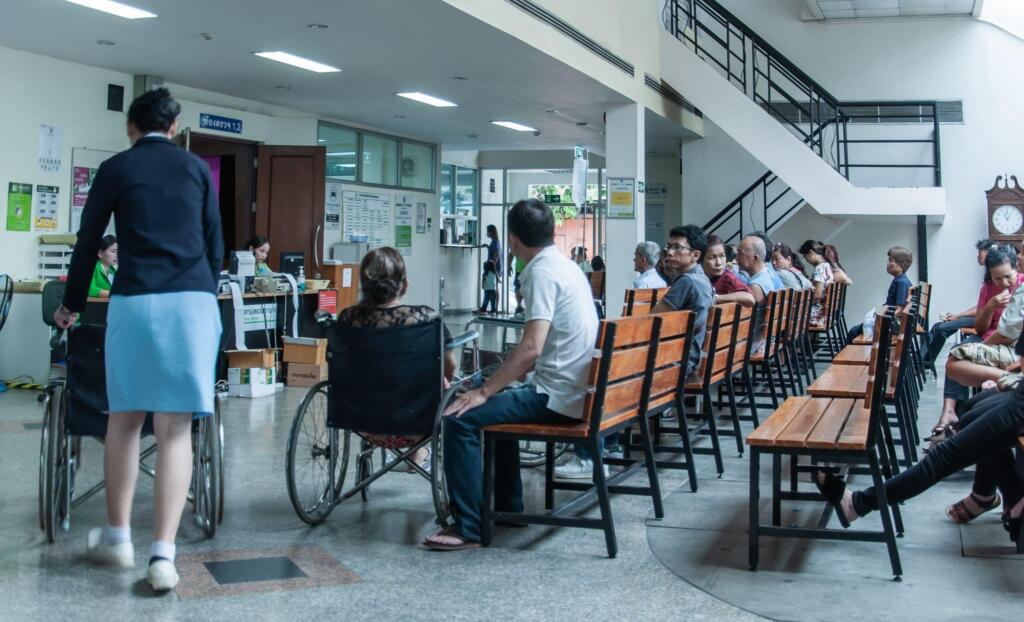
According to the Nomad List community, the best hospital in Bangkok is the Bangkok Hospital. The hospital offers cancer treatment, health checks, surgery, and dental care. You’ll find it at 2 Soi Soonvijai 7, New Petchburi Road, Bangkapi, Huai Khwang, Bangkok 10310, Thailand.
Here are other hospitals you can visit:
- Bangkok Adventist Mission Hospital, located at 430 Phitsanulok Road, Bangkok 10100.
- Bangkok Christian Hospital, located at 124 Silom Road, Bangkok 10500.
- Bangna Hospital, located at Km 3, Na-Trat Road, Bangkok 10260.
- BHN Hospital (formerly the Bangkok Nursing Home), located at 9/1 Convent Road, off Silom Road, Bangkok 10500.
- Bumrungrad Hospital, located at 33 Sukhumvit 3 Road, Wattana, Bangkok 10110.
- Central General Hospital, located at 362/114 Phaholyothin Road, Bang Khen, Bangkok 10220.
- Chao Phya Hospital, located at 113/44 Boromratchonnee Road, Bangkok Noi, Bangkok 10700.
- Deja General Hospital, located at 246 Sri Ayutthaya Road, Ratchathevi, Bangkok 10400.
Health insurance
Travel medical insurance is vital for digital nomads visiting Bangkok. In this regard, Safetywing is a recommended choice by Nomad List.
Safetywing allows digital nomads to sign up for Nomad Insurance before or during their journey abroad. Flexible insurance offers continuous coverage under one policy, even when traveling to multiple countries. It also features cover for brief home visits for 30 days (15 days for US residents) after 90 days abroad. The cost is USD 45.08 every four weeks (28 days).
Note that the coverage includes a $250 deductible (an out-of-pocket amount you’ll pay toward a covered claim) and has a $250,000 maximum limit.
Health care quality
With high service standards, internationally accredited hospitals, and many English-speaking doctors, it’s easy to see why Bangkok has become a hub for medical tourism. The growth in medical tourism is due to the spread of positive experiences from foreigners who have settled in Thailand, increased competition among hospitals, and lower costs compared to Western countries.
Additionally, affordable plane tickets make it easier for people worldwide to access the city’s healthcare facilities. More than a million medical tourists visit Thailand annually, and the industry is growing at an impressive rate of 20-30% annually.
Although most drugs are available at lower prices than in the West, insulin can be expensive. The origin of a medical drug affects the price, with some being Thai-made, some imported from neighboring countries, and others from Western countries. While you can buy many pharmaceuticals restricted in foreign countries over-the-counter in Thailand, some require a doctor’s prescription.
If the brand of medical drugs you prefer isn’t available, you may have to purchase generic ones. For instance, migraine medication is available at a similar cost to the West, whereas generic anti-malaria drugs cost only a fraction.
Vaccination
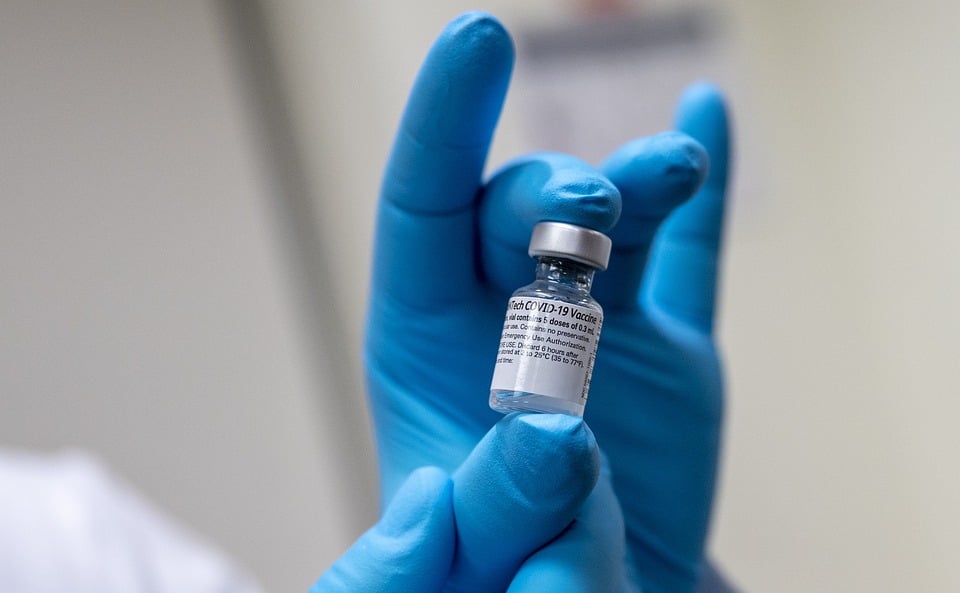
A vaccine.
For US citizens, the CDC recommends the following routine vaccinations if traveling to Thailand:
- Chickenpox (Varicella)
- Flu (influenza)
- Diphtheria-Tetanus-Pertussis
- Polio
- Measles-Mumps-Rubella (MMR)
- Shingles
Besides such routine vaccinations, you may need various others, depending on your specific situation (consult the approved medical professionals). These extra vaccines include COVID-19, Hepatitis A, Cholera, Hepatitis B, Malaria, Typhoid, Japanese Encephalitis, Rabies, and Yellow Fever.
Electrical and measurement standards
Thailand’s electrical outlets run on 220v with 50 cycles per second, making them compatible with UK appliances. However, devices from the US and other countries may require voltage adaptors. Also, most outlets feature flat, two-pronged plugs, with some having holes for round plug ends. While few outlets have grounded outlets, carry a three-to-two-prong adapter for your notebook computers.
Thailand uses the metric system for weights and measurements, except for land measurement, which uses wa and rai. One square wah equals four square meters, while one acre is 2.529 rai or 43,560 square feet. One ngan equals 100 wah or 400 square meters, and one hectare is 6.25 rai or 10,000 square meters. One rai equals four ngan or 1,600 square meters.
Internet
The city offers extensive Wi-Fi connections with various restaurants, hotels, and cafés, providing free Wi-Fi internet access to guests and customers. You’ll also get Internet services at the many “Cyber-Cafes.”
For paid Internet services, you’ll find multiple providers for mobile internet (AIS, TrueMove H, and DTAC) or fixed internet (3BB, AIS, TOT, and True Online).
Here are the typical Internet speeds to expect:
| Median Speeds | |||
| Download (Mbps) | Upload (Mbps) | Latency (ms) | |
| Mobile Internet | 43.6 | 15.21 | 21 |
| Fixed Internet | 228.51 | 194.63 | 5 |
Telephone services
You definitely will be able to stay connected. Thailand’s telephone system is modern and extensive, with reliable payphones nationwide, and cell phone reception covers all but the most remote Thai islands. Moreover, internet cafes in most urban and tourist areas have Skype on their computers.
If you’re bringing your overseas cell phone, ensure it is GSM compatible since Thailand has GSM 900 and 1800 networks.
Public telephones
Pay phones are accessible in the city. These coin-operated pay phones are cheap, costing only 1 baht per minute with local calls. Card phones are also widely available, especially in tourist areas, and accept prepaid phone cards or credit cards. However, they can be expensive, with rates up to 18 baht per minute. Prepaid phone cards are a better option, available in 300 baht denominations and sold at convenience stores.
Public telephones charging by the minute for both local and overseas calls are available at post offices.
How to register for a SIM card
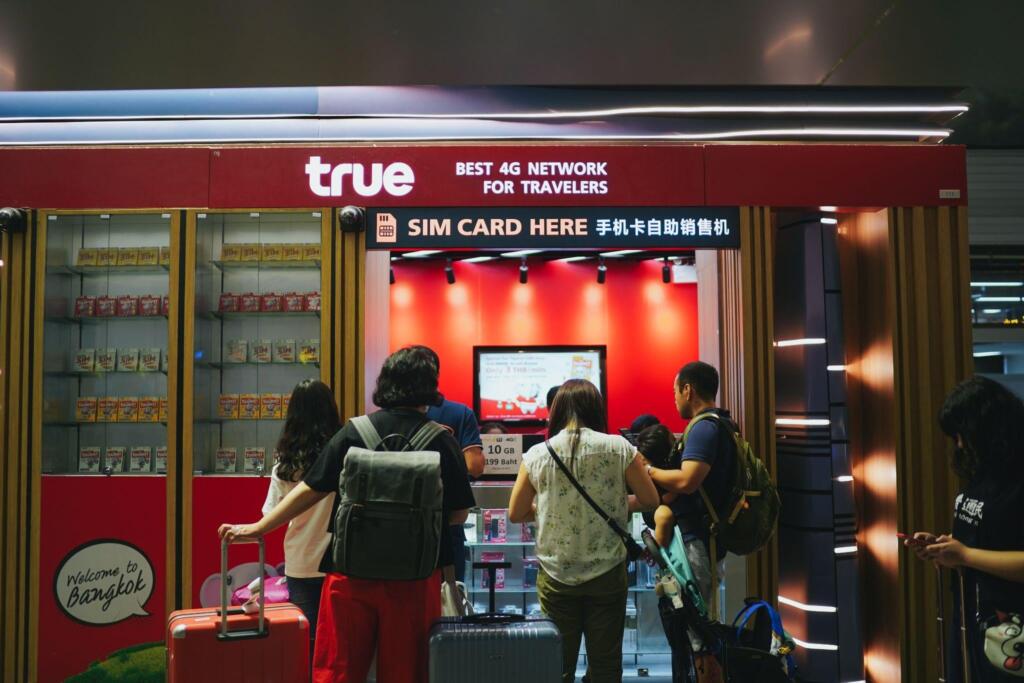
To get a Thai SIM card, visit international airports or rental mobile phone stores. English-speaking workers at post offices can also help you obtain a SIM card. If your phone has no SIM card slot, you can buy a new or used one at places like the MBK Shopping mall.
Mobile phone plans and cost
Thailand has three leading cell service providers: DTAC, AIS, and TrueMove H.
Here are the typical phone plans you’ll find from these providers:
- 30-day package from AIS for calls to all networks: Features 1,800 minutes with 60 minutes/ day. Costs 369 Baht
- 30-day package from AIS for unlimited internet: Features speeds of 10 Mbps. Costs 1,100 Baht.
- Unlimited Data & Calls by TrueMove H: Features true-4g, 4G/3G, 300 Mbps max internet speed, and more. Costs 0.5 THB/min (charges calculated per second) for calls and 1 THB/MB for data.
Country codes
To call Thailand from overseas, use the international country code +66. To call another country from Thailand, dial 001, followed by that country’s code. However, long-distance providers offer different codes at higher rates, such as 007, 008, or 009 instead of 001.
You can also dial 110 for international operator assistance. When calling within Thailand, remember that phone numbers have an area/ city code or cell phone prefix. For example, Bangkok’s city code is (0)2, Chiang Mai’s is (0)53, and the cell phone prefix is (0)8. If calling from a Thai phone, include the 0, but if calling from overseas, omit it. Thus, a call to Bangkok from overseas would begin with +66-2…, while a call within Thailand would begin with 02…
Emergency numbers
Emergency numbers in Thailand are typically three- or four-digit numbers.
Here are helpful numbers that you may need in emergency situations:
- Tourism Police: 1155
- TAT (Tourism Authority of Thailand) Call Center: 1672
- Ambulance: 1669
- Fire: 199
- Government: 1111
- Central Emergency (Ambulance, Police, and Fire): 191
- Crime Suppression: 195 or (662) 513 3844
- Immigration Bureau: (662) 287 3101-10
Payment services and infrastructure
Thailand has a well-established financial infrastructure. The country supports a wide range of local and international payment services.
You’ll also find that it has many local and international banks to serve your needs, including:
- Bank of Ayudhya
- Bank of Thailand
- Siam Commercial Bank
- Bangkok Bank
- Kasikorn Bank
- Krung Thai Bank
- TMB Bank
- Cimb Thai Bank
- Export-Import Bank
- UOB Bank
- HSBC Bank
- Kiatnakin Bank
- Islamic Bank
- Deutsche Bank
- Bank of Tokyo – Mitsubishi
- Thanachart Bank
- TISCO Bank
- Standard Chartered Bank
- Citibank
- Scotia Bank
- Mega International Commercial Bank
Popular domestic payment services
While physical Thai Baht is the most widely accepted payment, most establishments accept major credit and debit cards, but additional fees may apply. You can cash Travelers’ cheques at banks but less commonly at retail outlets.
Accessible international payment services
As a digital nomad, you need access to hassle-free money transfer services. One option is Western Union, which charges substantial fees but is the easiest option to receive money. For instance, Bank of Ayutthaya branches offers Western Union services. With just your passport, you can also receive money through wire transfer at foreign exchange sections in leading banks.
Currencies and exchange rates
Thailand’s currency is the Thai Baht, which comes in paper denominations of 10, 20, 50, 100, 500, and 1,000. There are coins in the following denominations: 1, 2, 5, 10, 25, and 50 satangs.
Banks and legal money-changers give the best exchange rates, while ATMs that accept credit cards are easily accessible. Exchange booths can also provide cash advances on your credit card but may charge an extra fee.
The current exchange rate is: 1 USD = 34.320002 THB.
Remember that there’s no limit to how much money you can bring into Thailand, but you can only leave with more than 50,000 baht per person if you have special authorization. So, make sure to plan your finances accordingly before your trip.
Climate and seasons
Bangkok is a favored spot for people seeking tropical warmth, with slight temperature variations between seasons. The city’s climate is hot and humid all year round. The summer season is hot from March to June, with daytime temperatures ranging from 33°C to 48°C and night temperatures not below 27°C. The monsoon season runs from July to November, with heavy rainfall around 5.00 pm. During the day, the temperature ranges from 32°C to 16°C at night. From November to February, the cool season is relatively dry and sunny. Temperatures range from 32°C during the day to a comfortable 16°C at night and as low as 12°C in the North.
Pack breathable clothes and stay hydrated, regardless of the season. A light waterproof jacket and closed shoes are perfect during the rainy months of July to November.
Here is an overview of the monthly weather patterns:
| Monthly Averages | Jan | Feb | Mar | Apr | May | Jun | Jul | Aug | Sep | Oct | Nov | Dec |
| Daily max temperatures (°C) | 33 | 34 | 35 | 36 | 35 | 34 | 33 | 33 | 33 | 33 | 33 | 32 |
| Relative humidity (%) | 67 | 71 | 72 | 71 | 75 | 74 | 75 | 75 | 79 | 77 | 67 | 63 |
| Rainfall (mm) | 19 | 22 | 52 | 104 | 245 | 190 | 199 | 230 | 339 | 275 | 56 | 7 |
| Daily sunshine (hrs) | 9 | 8 | 9 | 8 | 7 | 6 | 6 | 5 | 5 | 7 | 8 | 9 |
Popular Cuisine
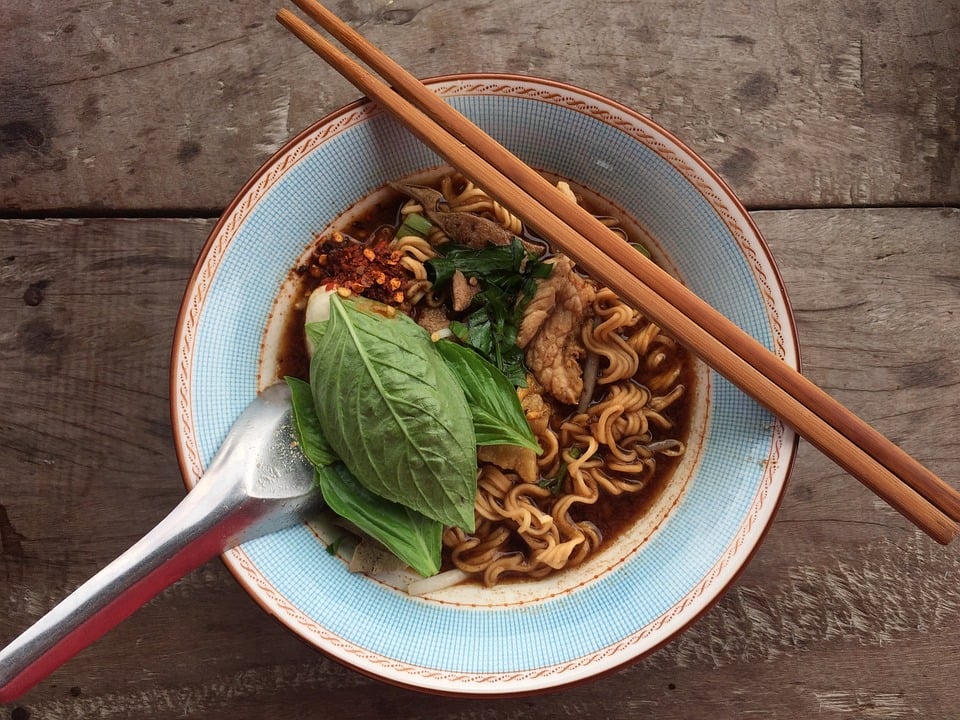
Noodle recipe:
Take advantage of the opportunity to taste internationally famous Thai food during your visit. Thai cuisine combines centuries-old Eastern and Western influences harmoniously blended into a unique Thai delicacy. Aquatic animals, herbs, and plants are the primary ingredients because of the waterborne lifestyle. Traditional cooking methods feature stewing and baking, and Chinese influences introduced stir-frying, frying, and deep-frying.
Thais are clever at ‘Siamese-ising’ foreign cooking methods and substituting the ingredients. The overpowering pure spices are toned down and enhanced by fresh herbs like lemon grass and galangal. They serve meals altogether, so you enjoy complementary combinations of tastes. And a proper Thai meal has a curry dish with condiments, soup, and dip with fish and vegetables. Spicy salads may replace a curry dish.
Here, you can expect a meal at an inexpensive restaurant to cost $2.92 (฿100.00).
Tax requirements on digital nomads
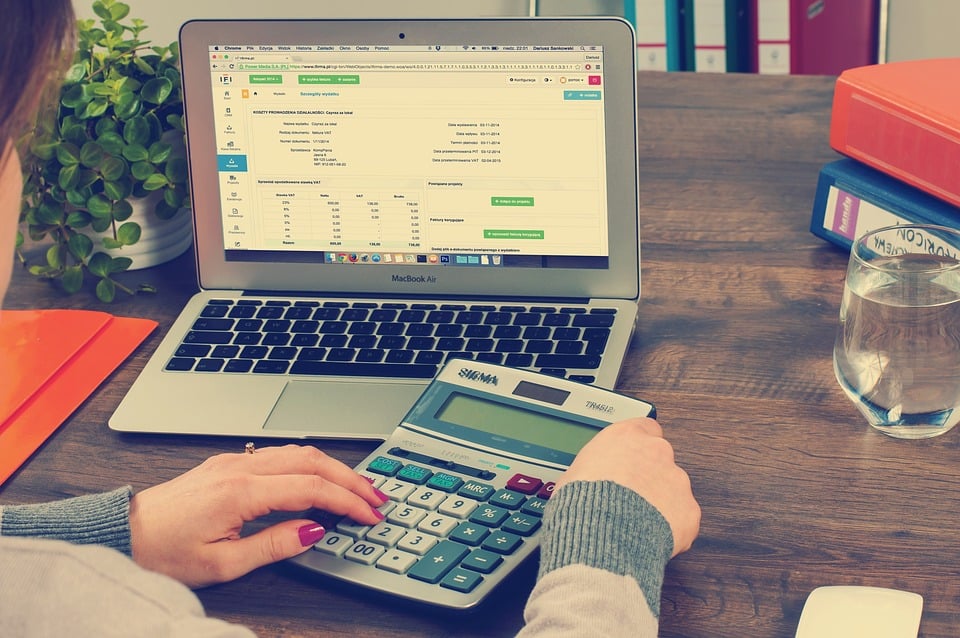
To plan your finances properly, be aware of the tax requirements when traveling to Thailand. Fortunately, the government offers a reduced personal income tax rate for Long-Term Resident Visa holders, charging only 17% instead of 35% for those earning over USD 140,000. Additionally, visitors can bring personal effects valued up to 80,000 Baht without paying import fees if they are for personal or professional use. Note that there are amount restrictions on alcohol and tobacco products transportable duty-free.
Furthermore, the LTR gives you tax exemption on your overseas income. Plus, visitors can claim a refund of the 7% VAT on goods bought at registered retail outlets if they meet specific criteria.
Common concerns
Despite being a popular destination for digital nomads, some things could be improved to living in Bangkok. The city can feel crowded, and the air can be dry during certain times of the year. The temperature can also be scorching in the summer, which can be uncomfortable for some. Additionally, the city has weak freedom of speech and is not considered very democratic. Moreover, the quality of education is low, and people don’t speak English very well.
Even so, Bangkok is still a top choice for many digital nomads due to its warm weather all year round, fast internet, and abundant fun activities. The city is safe, making it an excellent choice, especially for women and families. It’s easy to make friends, and doing business is very straightforward. The city also has exceptional hospitals, making it an excellent choice for those needing medical attention.
Overall, Bangkok has many benefits for digital nomads.
Always check with local country websites for the most up to date visa, health, tax and travel requirements before entering a country. This article is general information and does not constitute legal advice, check with a legal professional for visas, working visas, applicable tax and crypto laws specific to you.


